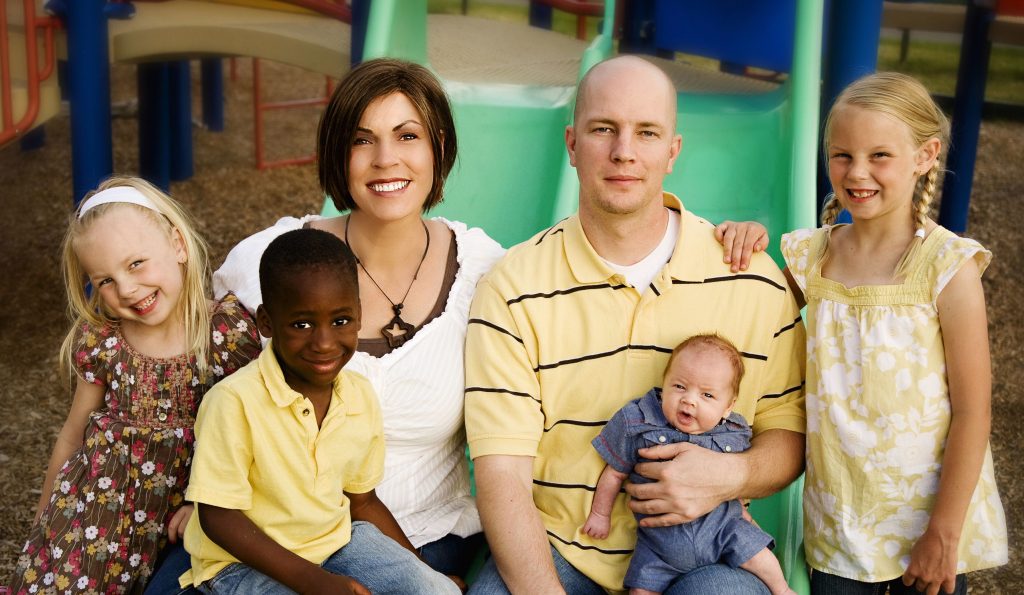February 8, 2010, Riverdale, UT
In 2005, Shannon Cox founded Haitian Roots, an organization that sends 133 needy Haitian children to school each year. Shannon recounts the unexpected adoption of her Haitian son and the ways it opened her heart and mind to the plight of Haiti’s strong-willed people. This young mother of four affirms the unexpected course of her life is not the consequence of coincidence but divine intervention.
Haitian Roots provides sponsorship for Haitian children who want to go to school. How did you first become involved with Haiti and find the motivation to start this program?
The story of Haitian Roots began about seven years ago when I was first married, working from home for an international adoption agency. Because I speak fluent Spanish, I was running the agency’s Guatemala program, but the agency encouraged me to expand its efforts in other countries. Through my research, I started getting hung up on the beautiful children from Haiti. I didn’t know anything about Haiti, even where it was. Soon, everywhere I turned, I heard about Haiti. I started teasing my husband that we were going to adopt a little boy from Haiti. In the back of my mind, I thought that if I got the agency to start an adoption program in Haiti maybe I could find my son, if I really did have one. I was able to get the Haitian adoption program up and running, and I thought someday—years down the road, if I was supposed to—I would adopt a child. I then had some very spiritual experiences that let us know that my son was soon going to be born in Haiti, even though we had two very young daughters and didn’t even qualify for adoption by Haitian law, which requires adoptive parents to be at least 35 years old, married for a minimum of 10 years and have no biological children.
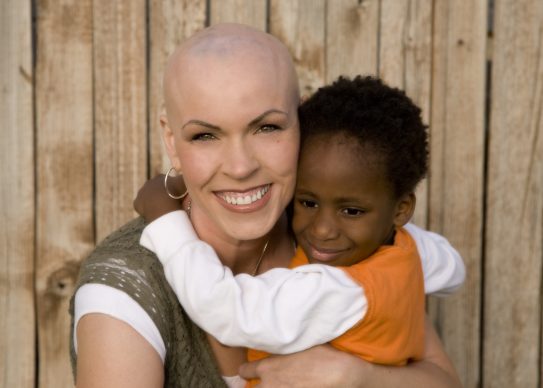
Our first trip to the country was to see our son, who was two months old at the time of our visit. We were very overwhelmed by the poverty. It was staggering, worse than anything I had seen. My husband and I felt hopeless and wondered how things could get any better for these people—until we attended church. We had been in Haiti a couple of days and were able to have our son with us. As we walked through the gates to get into the church, we heard forty or fifty Elders singing at the top of their lungs “We Thank Thee O God for a Prophet.” An overwhelming feeling of the Spirit suddenly filled us with hope.
After that first trip, my husband and I thought it would be cool if someday we could do something to give back. We both have a strong passion for education and feel it’s really the key to eradicating poverty. We talked about the idea of sponsoring a child to go to school. Again, we thought maybe someday down the road when our kids were grown we would have the time to put together an organization. But little by little, prompting after prompting, Haitian Roots began.
While we were in the process of adopting our son, we made close friends who are native Haitians, and we started talking to them about the idea. They had sponsored some children to go to school, and we felt strongly that we should get started. We had a goal to send 20 children to school the first year, the 2005-06 school year. We have 133 children in the program right now. Eventually we plan to build and run a primary school for children during the day and a technical school for youth at night. With this, we feel our organization will give children of Haiti an alternative to the path of poverty.
In the years since Haitian Roots began, how have you seen the lives of these children change? Do you still feel like education is the key to hope?
Every time I go to Haiti, I become more passionate about education. I’m afraid to take credit for anything that’s happened because I see the Lord’s hands in it so much. I know I need to remain humble so He will lead us and help us. Our co-founder’s mother said, “You have no idea what you are doing for these families. It’s literally like angels have come down and lifted them out of the mud and set them on solid ground.” I see that. A lot of the time families have to choose between eating and education. In Haiti they value education so much. They know and feel that if they can get to school maybe things will change. It’s really their key to hope.
Our organization is not affiliated with the Church directly, but we have seen miracles and some of our families and children have become interested in the Gospel and in reading the Book of Mormon.
In our original group there were two boys, 12- and 13-year-old brothers, Max and Jackie. I felt really drawn to these brothers and have kept close tabs on them. I call them “my boys.” After a series of miracles, both boys were baptized. On a trip to Haiti in 2008, Max passed me the sacrament. I was just sobbing. Right then, I had the feeling that although we can’t accomplish a huge amount there might be certain people the Lord has in mind for us to touch. And so, if this whole organization—everything—is for these boys getting an education, learning about the Gospel, joining the Church, blessing generations to come, and forever changing Priesthood leadership in Haiti, it is worth all the effort.
We’re hardly making a dent. When you look at all of Haiti it feels so hopeless, so I try to look at the kids we are helping.
How has your focus changed since the earthquake?
Right now, we’ve only been able to account for 40 of the 133 children we sponsor. We already know that two of our children are orphaned. A lot of our families have lost their homes. We do know that a couple of our children have lost their lives.
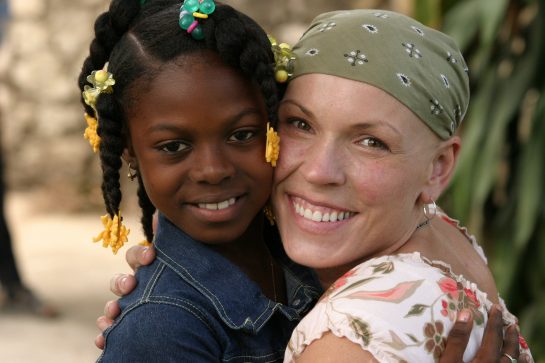
The only thing that has saved me from being completely distraught about the earthquake is an understanding that I don’t have a right to be distraught. A lot of people have called asking how I am. It makes me feel really bad because this isn’t about me. I don’t have a right to be sad and depressed or to earn any attention. I tell people to please give all of their energy and attention to Haiti.
Our focus as an organization is going to be on rebuilding. We’ve got a lot of people helping to get donations, tents, food and water filters to Haiti. A close friend of mine who is an emergency room doctor was one of the first physicians on the ground after the earthquake. After seeing all of the horror, he called and said, “We have to build a school!” It warmed me to know that with everything he saw, it was the need for education that struck him most. We have to get education to Haiti so the people can know how to do things for themselves. Some people have called the quake a rebuilding or renewal. A friend said it’s a rebirth of Haiti, and that’s the way I like to see it. I don’t, in any way, say that the earthquake was a blessing. It is a horrible catastrophe and tragedy. Every person that I know in Haiti has lost loved ones. No one has been unaffected.
How would you suggest people help with earthquake relief?
Fundraising. There are a lot of people who want to go to Haiti and volunteer. And there will be a time for that. But not right now. I haven’t even been able to go, yet, because of the burden, the stress I would put on my coordinators in Haiti. When I’m there, they are so worried about my safety and my comfort. Right now, I would be more of a burden than a help. They need medical and disaster personnel. I know it seems exciting to go and get your hands in, but that’s not the way to help right now. The help needed is in fundraising or in donating items. However, on a spiritual level, I would always tell people to pray.
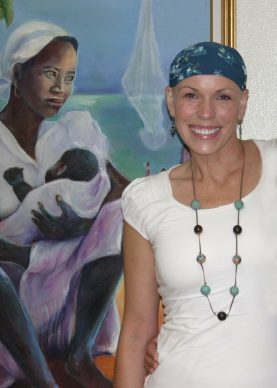
I feel like Haitian Roots is a mission the Lord has for me. My mission is also motherhood, and my children come first. But this is another mission the Lord has given me, and I love it. But Haitian Roots isn’t the only group doing good in Haiti. There are a lot of really wonderful organizations. This is what the Lord wants me doing, but it’s not the only good way to get involved.
As you also focus on motherhood, where you do find your energy and time?
I don’t sleep much. It’s constantly a struggle. I’m not perfect at keeping my priorities in line. A lot of times I find that I’m sitting at my computer or I’m on the phone with someone crying about the children in Haiti while my kids are tugging on my arms and running around me in circles. That’s when I stop and reevaluate. I try to focus my attention on my children during the day and cherish that time. My nights are spent on the computer and on the phone. I even schedule meetings after the kids are in bed. I’m not perfect at it. No one is. Some days I think, I did really well. I was a good mom today. Other days I go to bed thinking, I really lost my temper or I really neglected them. And then, I vow to be better the next day. I’m grateful for all of the things the Lord has given me, and I hope I’m prioritizing them correctly.
Looking back on the direction of your life as a mother, why do you think you were guided towards adoption at a time when you were busy, successfully building a young family?
I wasn’t having infertility problems. In fact, one of our daughters was two years old and the youngest was nine months old when we started the adoption process.
One day I was out mowing the lawn with my daughter on my back in a backpack when I had a very spiritual experience. It was very simple. I was passing some roses and not an audible voice, but the clearest thought I’ve ever received said, “Your birth mother is pregnant right now, and you need to start praying for her.”
That was amazing and also overwhelming. I had no idea we were going to be adopting so soon. It wasn’t anything rooted in wanting to do good or saving a child. It was nothing like that. I had a child in Haiti. I had been enlightened to know there was a woman in Haiti who would bare my child. I knew she needed help, so I began praying for her that she would find the peace she needed. The feelings I had were as if one of my children that I had snuggled in bed was in a foreign country living in an orphanage. I had to get that child home. It wasn’t that I felt bad and wanted to help this country. Those feelings came later. When we visited Haiti to see our son for the first time, our desire to help all the children we left behind grew. We felt they were part of our family as well. We had a natural desire to want to help.
I believe that anytime God makes something happen, He doesn’t just do it. You have to do the work. He prompts you in the direction you need to go.
Not long ago, you lost all of your hair to alopecia areata. How have you come to terms with that change and how have the lessons of acceptance learned through your work in Haiti helped you to love and accept yourself?
When I lost my hair four years ago, it was really devastating. I couldn’t stand to look at myself in the mirror. I thought, I can still be a good person and accomplish the things the Lord wants me to do. But I feel ugly and will never find myself attractive. That’s a very sad attitude, and going to Haiti helped change that.
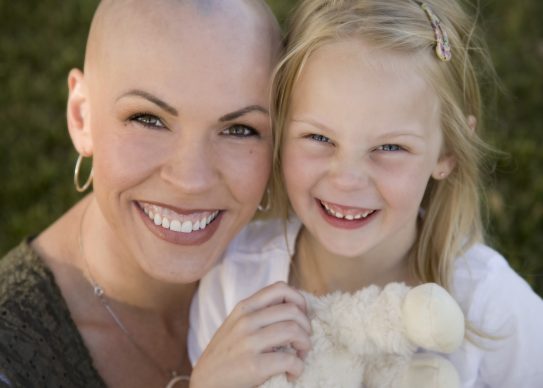
The first time I went to Haiti after I lost my hair, I was wearing bandanas. It was so hot. Of course I stood out. I’m white and almost six feet tall. Interestingly, none of the Haitians thought twice about my not having hair. That was the least of their worries. In an orphanage I visited, I noticed a boy who was completely healthy but who had no hair and no eyebrows. I discovered he, too, had alopecia. I held him on my lap. (To this point I had been terrified to show my bare head to anyone. I felt like I was naked if I did.) I took off my scarf for the first time in front of a bunch of people. The boy stared at me and gave me the biggest smile. He touched my head and he touched his head. There was an immediate connection, and I thought, Maybe it’s not a horrible thing. Maybe it’s not ugly.
Another turning point came one night when I walked into the living room and screamed because I saw a tall bald man in the window. I stopped and realized it was me. It hit me that if I couldn’t recognize my own reflection, something was wrong. I prayed to Heavenly Father saying, “I am no longer that person I recognize in the mirror, so who am I?” Little by little things came to me in my study, and I knew it was Heavenly Father teaching me. I now realize that if my soul or my spirit is at least 10,000 years old, probably much older, I cannot let myself be defined by this physical body that I’ve only had for 35 years. I’m grateful for my body. It is a gift. But it does not define who I am. As I’ve discovered these things, I’ve redefined beauty. My entire way of thinking about beauty has changed.
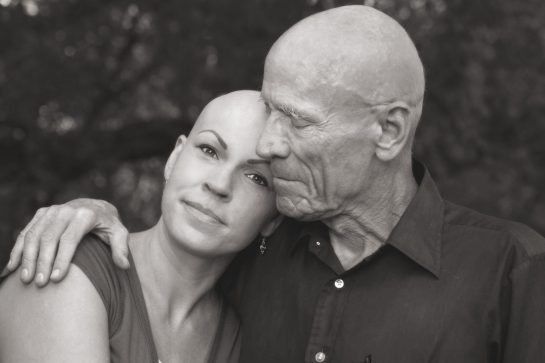
Shannon with her father
How would you encourage women to find their missions for doing good?
Follow the promptings of the Spirit. Every soul has worth to our Heavenly Father. If you feel prompted in any way, you should follow those promptings. It might be one person that you help. Maybe you won’t know the effect you have on somebody, but if there’s one soul it‘s worth your energy. Nothing is too little.
At A Glance
Shannon Pearl Allred Cox
 Location: Riverdale, UT
Location: Riverdale, UT
Age: 35
Marital status: Married 9.5 years
Children: 4 (ages 8, 6, 5, and 11 months)
Occupation: Mom, founder of Haitian Roots, Spanish interpreter
Schools Attended: Ogden High School, Weber State University
Languages Spoken at Home: English
Favorite Hymn: “Come Thou Fount of Every Blessing” (not in our current hymn book but wish it was)
Current Church Calling: Gospel Doctrine teacher
On the Web: www.haitianroots.com
Interview by Melissa Hardy. Photos used with permission.
At A Glance

